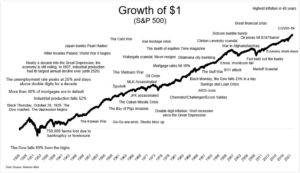“If you want to make the wrong decision, ask everyone.” – Naval Ravikant, author and investor
I want to wait and see what happens with the mid-term elections.
I want to wait and see what happens with COVID.
I want to wait and see how Russia – Ukraine shakes out.
I want to wait and see.
I would counter with, “what are you waiting to see?”
Is there an “all-clear” signal to invest?
Where can I find the “nothing to see here, just plow your money in and watch the gains pile up” indicator?
The more information we get, the harder it is to filter the relevant signal vs. noise. We are left paralyzed playing the wait and see game (creating an information filter is the most underrated attribute of skillful investors).
Waiting and seeing often leaves us in a worse spot than before. The market zooming higher while we fester in a vortex of indecision…

Source: Returns Web, Michael Batnick, Twitter
The above shows a long-term chart of the S&P 500 overlaid with world events and news headlines. In the moment, every crisis feels like the worst thing ever. In hindsight, every crisis was a “no-brainer” investment opportunity.
Here’s what the “wait and see” crowd often misses when evaluating investment opportunities…
- The market is looking ahead, not what’s happening now. The market doesn’t wait and see for anything. It anticipates what happens next.
- If your golf buddies are talking about it, or if you read it on CNBC, the market knows about it.
I had a client that wanted to put a substantial sum into Visa. I was curious about his reasoning.
“They get 2% per card swipe.”
Great for Visa, but that isn’t insider knowledge. The market knows.
The market and economy can become unhinged
It’s really quite common, especially in emerging markets (see reason #1).
From our Sept. 14th, 2021 post, “Is the Market Unhinged from the Economy?” on the link between economic growth and stock market returns…
“The results were mixed and the evidence linking equity returns to GDP growth was weak, surprising many investors and economists.”
Trying to draw a clean line between economic activity and market movements can result in frustration and allocation mistakes.
Markets are mostly efficient, with moments of sheer irrationality
The academics created the Efficient Market Hypothesis, which states that stock prices reflect all available information.
In practice, the efficient market hypothesis is mostly true, but not always true.
The market can become unhinged from reality.
This is the emotional, human element of investing.
The Efficient Market Hypothesis could be mapped over to human behavior.
“Human behavior is mostly rational, occasionally becoming unhinged from reality.”
Replace “market” with “human” and it makes sense.
Back to the original question… Is there an elusive all-clear signal to get fully invested?
Not really.
A foolproof “all-clear to invest” signal doesn’t exist.
This is the closest thing we could find…
If you’re sitting on cash to invest, you feel fearful, panicked, and pessimistic about future stock returns and you’re absolutely certain the market is going to crater. That’s the closest thing we can get to an all-clear signal.
In our opinion, the best time to get fully invested (or more aggressive in your allocation) is when you feel the worst.
If you can’t get out of your own way, let’s talk about psychology and money decisions.
